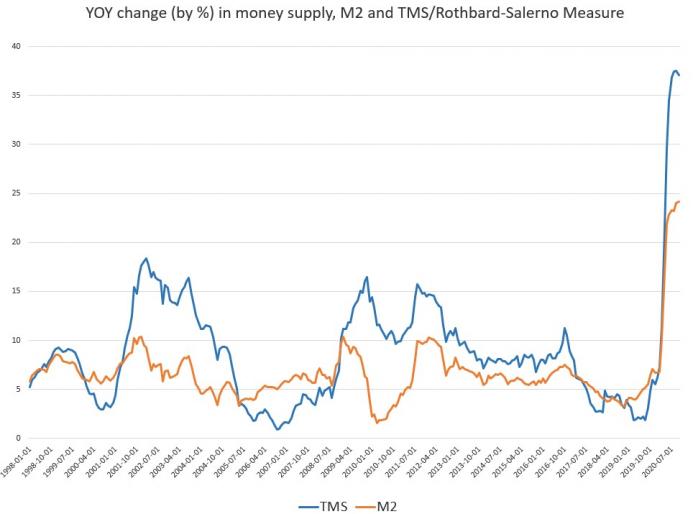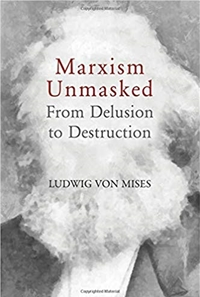In the Ruins of Neoliberalism: The Rise of Antidemocratic Politics in the West by Wendy Brown Columbia University Press, 2019 viii + 248 pages Wendy Brown, a well-known political theorist who teaches at UC Berkeley, does not like Friedrich Hayek very much. She in part blames him and others as well, including Milton Friedman and James Buchanan, for policies that have led to the bad state of the world in general and America in particular today. In the Ruins of Neoliberalism covers other topics, ranging from the case of the Colorado cake maker who refused to create a cake for a same-sex couple to the rise of nihilism about values and Herbert Marcuse’s “repressive desublimation” (not a good thing, I assure you); but I shall concentrate on what she says about Hayek.
Topics:
David Gordon considers the following as important: 6b) Mises.org, Featured, newsletter
This could be interesting, too:
Nachrichten Ticker - www.finanzen.ch writes Die Performance der Kryptowährungen in KW 9: Das hat sich bei Bitcoin, Ether & Co. getan
Nachrichten Ticker - www.finanzen.ch writes Wer verbirgt sich hinter der Ethereum-Technologie?
Martin Hartmann writes Eine Analyse nach den Lehren von Milton Friedman
Marc Chandler writes March 2025 Monthly
In the Ruins of Neoliberalism: The Rise of Antidemocratic Politics in the West
by Wendy Brown
Columbia University Press, 2019
viii + 248 pages
Wendy Brown, a well-known political theorist who teaches at UC Berkeley, does not like Friedrich Hayek very much. She in part blames him and others as well, including Milton Friedman and James Buchanan, for policies that have led to the bad state of the world in general and America in particular today. In the Ruins of Neoliberalism covers other topics, ranging from the case of the Colorado cake maker who refused to create a cake for a same-sex couple to the rise of nihilism about values and Herbert Marcuse’s “repressive desublimation” (not a good thing, I assure you); but I shall concentrate on what she says about Hayek.
Her most fundamental criticism of Hayek is that he opposes democracy in the sense in which she favors it. In her view,
democracy signifies political arrangements through which a people rules itself. Political equality is democracy’s foundation. Everything else is optional—from constitutions, to personal liberty, from specific economic forms to specific political institutions. Political equality alone ensures that the composition and exercise of political power is authorized by the whole and accountable to the whole. When political equality is absent, whether from extreme social or economic disparities, from uneven or managed access to knowledge, or from manipulation of the electoral system, political power will inevitably be exercised by and for a part, rather than the whole. The demos ceases to rule. (p. 23, emphasis mine)
One thing is missing from her account which you would expect to be present. Why is democracy in her sense a “good thing”? Is it just supposed to be obvious that it is? No doubt there are worse political systems than democracy, e.g., a communist dictatorship, but why is democracy to be preferred above all other social arrangements? She does not tell us. Her reticence is surprising in view of the considerable sympathy she shows for Nietzsche’s criticism of morality. But if values are subject to questioning, this value—democracy—is not.
Given this standpoint, it is easy to see what she has against Hayek. He opposed democracy as she understands it. She gives a good account of his views, stressing his opposition not only to democracy but to “social justice” and his defense of the spontaneous orders of the market and traditional morality. Hayek rejects just what she supports.
The cardinal sin of the Continental tradition, however, is its worship of popular sovereignty, a concept…that Hayek calls a dangerous “nonsense notion.” Popular sovereignty threatens individual freedom, licenses unbounded government, and confers supremacy on precisely the domain that needs to be leashed, the political. It permits legislative power to run amok, exceeding its task of formulating universal rules of justice, inevitably expanding the powers of the administrative state as it does so…[A]s legislative practice that exceeds universal rule making expands state power and curtails freedom, justice itself becomes confused. We mistakenly call “just” Hayek says, whatever lawmakers do, or whatever we think that they should do, rather than reserving the term for what the ancient Greeks called isonomía, “equal justice for all.” (pp. 68–69)
You might expect Brown after this account of Hayek’s view to show what is wrong with it, for example by arguing that popular sovereignty doesn’t lead to the bad consequences that Hayek fears. But she doesn’t do this. Instead, she treats what Hayek says merely as symptomatic; his position is not to be argued against but diagnosed. It is wrong because “democracy” is good—obviously.
Although she has read Hayek extensively, and on the whole gives an insightful account of his ideas, at one point she misstates them. Rightly stressing his support for traditional morality, she claims that Hayek’s ideas lead to a rejection of state provision of welfare to the poor and that he condemns completely “the social state’s replacement of family functions and replacement of moral law with social justice.” (p. 74) To the contrary, Hayek thinks that the decline of the extended family as the modern economy has grown makes a role for the state in providing welfare inevitable, and he favors such measures. In The Road to Serfdom, he says:
There is no reason why, in a society which has reached the general level of wealth ours has, the first kind of security should not be guaranteed to all without endangering general freedom; that is: some minimum of food, shelter and clothing, sufficient to preserve health. Nor is there any reason why the state should not help to organize a comprehensive system of social insurance in providing for those common hazards of life against which few can make adequate provision.”
Indeed, both Mises and Rothbard criticize Hayek for undue concessions to the welfare state. In a very favorable review of The Constitution of Liberty, Mises complains,
Unfortunately, the third part of Professor Hayek’s book is rather disappointing. Here the author tries to distinguish between socialism and the Welfare State. Socialism, he alleges, is on the decline; the Welfare State is supplanting it. And he thinks the Welfare State is, under certain conditions, compatible with liberty….However, the fact that Professor Hayek has misjudged the character of the Welfare State does not seriously detract from the value of his great book.
(Brown does not mention Mises at all in the book.)
Brown also wrongly suggests that Hayek, in his criticism of sovereignty, agrees with Carl Schmitt that political concepts are secularized theological concepts. She says, quoting Hayek,
Moreover, the very notion of sovereignty rests on a “false constructivist interpretation of the formation of human institutions which attempts to trace them all to an original designer or some other deliberate act of will.” Thus, Hayek concurs with Schmitt that sovereignty is a secularized theological concept, but, unlike Schmitt, regards sovereignty as false and dangerous because it is theological. (p. 70, emphasis in original)
But in speaking of an “original designer,” Hayek isn’t talking about an analogue to God but is contrasting institutions that arise through deliberate acts of human will with the products of spontaneous order.
If Brown’s discussion of Hayek is for the most part careful, the same cannot be said of her remarks about James Buchanan. Here, I regret to say, she is guilty of sloppy scholarship. She hasn’t read Buchanan but relies entirely on Nancy MacLean’s worthless screed Democracy in Chains (see my review of it). Brown says:
James Buchanan of the Virginia Public Choice School of neoliberalism decried public goods. . .he understood the importance of gerrymandering and voter suppression and alloyed his brand of free enterprise with the project of white supremacism.” (p. 62)
In fact, Buchanan wrote a book, The Demand and Supply of Public Goods, about the provision of public goods and the topic is a major theme in his long career as an economist. And, far from being allied with white suprematism, he supports preference for minority candidates in education and employment.
Most of the book is on a much higher level than this, though. Otherwise, we would be in the ruins of In the Ruins of Neoliberalism.
Tags: Featured,newsletter







